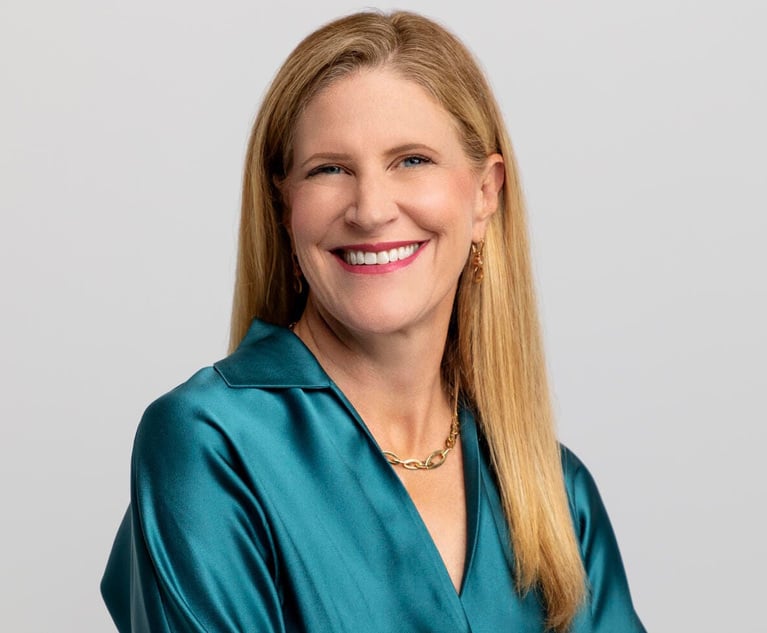Number of SEC Enforcement Actions at Highest in 10 Years
The U.S. Securities and Exchange Commission filed 95 new enforcement actions against public companies in fiscal year 2019—the most actions filed in the past 10 years of tracking the numbers, the New York University Pollack Center for Law & Business and Cornerstone Research reported Wednesday.
November 20, 2019 at 03:40 PM
4 minute read
 Stephen Choi, professor at the NYU School of Law and director of the Pollack Center for Law & Business.
Stephen Choi, professor at the NYU School of Law and director of the Pollack Center for Law & Business.
The U.S. Securities and Exchange Commission filed 95 new enforcement actions against public companies in fiscal year 2019—the most actions filed in the past 10 years of tracking the numbers.
The filings were a 30% increase over last year and were part of several significant trends reported Wednesday by the New York University Pollack Center for Law & Business and Cornerstone Research.
The report, "SEC Enforcement Activity: Public Companies and Subsidiaries—Fiscal Year 2019 Update," was co-authored by Sara Gilley, Cornerstone Research vice president. Gilley said in a statement, "Issuer reporting and disclosure actions against public companies helped to drive the record number of actions … similar to the high number of actions in [fiscal] 2016."
She was referring to allegations related to fraud and misconduct involving issuers and financial institutions. The commission brought 28 such actions, compared with an average of 20 per year from 2010 through 2018.
The overall increase in enforcement actions was also heavily driven by self-reporting under the commission's share class selection disclosure initiative. The initiative lets investment advisers avoid civil penalties by self-reporting any failure to make required conflict of interest disclosures when they receive fees for recommending certain mutual funds.
New York University law professor Stephen Choi, co-director of the Pollack Center and co-author of the report, told Corporate Counsel, "When you strip away the focus on the share initiative, the number is still high but not out of line with prior years."
Choi said the "big message" that general counsel can take from the report is that the dip in enforcement actions that occurred when the Trump administration took over in 2017 has ended and the numbers have returned to normal. "The SEC has since come back," he said, "and is enforcing vigorously."
Choi said one of the interesting trends to watch in the data was the record high percentage of cooperating defendants.
The report said the SEC noted cooperation by 76% of defendants this year, while the average from 2010 through 2018 was only 51%. "It confirms that the SEC is now focusing more on cooperation," he said.
Other trends to watch, he said, are the use of administrative law proceedings and the imposition of disgorgement. Both are being challenged in court.
The report showed in the first half of 2019 the commission brought 100% of its 52 enforcement actions as administrative proceedings, but in the second half the number dropped to 84%.
On disgorgement, Choi said historically the commission has ordered companies to cough up profits in roughly 50% of its monetary sanctions, and this year continued that trend. But if the U.S. Supreme Court rules in a pending case to limit the commission's power to impose disgorgement, Choi said, "it will affect how the SEC imposes monetary penalties going forward."
More trends noted in the report include:
- The largest settlement imposed in 2019 was $147 million—the lowest amount for the top settlement in the history of the database. The average settlement was $16 million. Settlements totaled $1.5 billion, consistent with the 2010 through 2018 average.
- This is the second consecutive year in which all 15 actions alleging violations of the Foreign Corrupt Practices Act were brought as administrative proceedings. In comparison, only 51% of actions alleging FCPA violations were brought as administrative proceedings prior to fiscal year 2018.
- As usual, the finance, insurance and real estate industry received the most enforcement actions, accounting for 58% of them. The average over the prior nine fiscal years was 48% for the industry. A distant second was manufacturing, at 15%.
Correction: A previous version incorrectly said Gilley was referring to the self-reporting under the commission's Share Class Selection Disclosure Initiative. She was referring to allegations related to fraud and misconduct involving issuers and financial institutions.
This content has been archived. It is available through our partners, LexisNexis® and Bloomberg Law.
To view this content, please continue to their sites.
Not a Lexis Subscriber?
Subscribe Now
Not a Bloomberg Law Subscriber?
Subscribe Now
NOT FOR REPRINT
© 2025 ALM Global, LLC, All Rights Reserved. Request academic re-use from www.copyright.com. All other uses, submit a request to [email protected]. For more information visit Asset & Logo Licensing.
You Might Like
View All
Wells Fargo and Bank of America Agree to Pay Combined $60 Million to Settle SEC Probe

Amex Latest Target as Regulators Scrutinize Whether Credit Card Issuers Deliver on Rewards Promises

Former Capital One Deputy GC Takes Legal Reins of AIG Spinoff
Trending Stories
- 1'Nation is in Trouble': NY Lawmakers Advance Bill to Set Parameters for Shielding Juror IDs in Criminal Matters
- 2Margolis Edelstein Broadens Leadership With New Co-Managing Partner
- 3Menendez Asks US Judge for Bond Pending Appeal of Criminal Conviction
- 4Onit Acquires Case and Matter Management Software Provider Legal Files Software
- 5As Nonprofits Plead for Answers, Dem AGs Plan Suit to Block Trump Funding Freeze
Who Got The Work
J. Brugh Lower of Gibbons has entered an appearance for industrial equipment supplier Devco Corporation in a pending trademark infringement lawsuit. The suit, accusing the defendant of selling knock-off Graco products, was filed Dec. 18 in New Jersey District Court by Rivkin Radler on behalf of Graco Inc. and Graco Minnesota. The case, assigned to U.S. District Judge Zahid N. Quraishi, is 3:24-cv-11294, Graco Inc. et al v. Devco Corporation.
Who Got The Work
Rebecca Maller-Stein and Kent A. Yalowitz of Arnold & Porter Kaye Scholer have entered their appearances for Hanaco Venture Capital and its executives, Lior Prosor and David Frankel, in a pending securities lawsuit. The action, filed on Dec. 24 in New York Southern District Court by Zell, Aron & Co. on behalf of Goldeneye Advisors, accuses the defendants of negligently and fraudulently managing the plaintiff's $1 million investment. The case, assigned to U.S. District Judge Vernon S. Broderick, is 1:24-cv-09918, Goldeneye Advisors, LLC v. Hanaco Venture Capital, Ltd. et al.
Who Got The Work
Attorneys from A&O Shearman has stepped in as defense counsel for Toronto-Dominion Bank and other defendants in a pending securities class action. The suit, filed Dec. 11 in New York Southern District Court by Bleichmar Fonti & Auld, accuses the defendants of concealing the bank's 'pervasive' deficiencies in regards to its compliance with the Bank Secrecy Act and the quality of its anti-money laundering controls. The case, assigned to U.S. District Judge Arun Subramanian, is 1:24-cv-09445, Gonzalez v. The Toronto-Dominion Bank et al.
Who Got The Work
Crown Castle International, a Pennsylvania company providing shared communications infrastructure, has turned to Luke D. Wolf of Gordon Rees Scully Mansukhani to fend off a pending breach-of-contract lawsuit. The court action, filed Nov. 25 in Michigan Eastern District Court by Hooper Hathaway PC on behalf of The Town Residences LLC, accuses Crown Castle of failing to transfer approximately $30,000 in utility payments from T-Mobile in breach of a roof-top lease and assignment agreement. The case, assigned to U.S. District Judge Susan K. Declercq, is 2:24-cv-13131, The Town Residences LLC v. T-Mobile US, Inc. et al.
Who Got The Work
Wilfred P. Coronato and Daniel M. Schwartz of McCarter & English have stepped in as defense counsel to Electrolux Home Products Inc. in a pending product liability lawsuit. The court action, filed Nov. 26 in New York Eastern District Court by Poulos Lopiccolo PC and Nagel Rice LLP on behalf of David Stern, alleges that the defendant's refrigerators’ drawers and shelving repeatedly break and fall apart within months after purchase. The case, assigned to U.S. District Judge Joan M. Azrack, is 2:24-cv-08204, Stern v. Electrolux Home Products, Inc.
Featured Firms
Law Offices of Gary Martin Hays & Associates, P.C.
(470) 294-1674
Law Offices of Mark E. Salomone
(857) 444-6468
Smith & Hassler
(713) 739-1250







